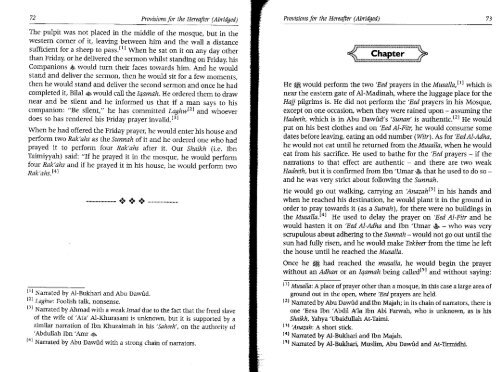Provisions for the Hereafter (Zaad Al-Ma'ad)
Provisions for the Hereafter (Zaad Al-Ma'ad)
Provisions for the Hereafter (Zaad Al-Ma'ad)
Create successful ePaper yourself
Turn your PDF publications into a flip-book with our unique Google optimized e-Paper software.
72 <strong>Provisions</strong> <strong>for</strong> <strong>the</strong> <strong>Hereafter</strong> (Abridged)<br />
The pulpit was not placed in <strong>the</strong> middle of <strong>the</strong> mosque, but in <strong>the</strong><br />
western corner of it, leaving between him and <strong>the</strong> wall a distance<br />
sufficient <strong>for</strong> a sheep to pass.r 11 When he sat on it on any day o<strong>the</strong>r<br />
than Friday, or he delivered <strong>the</strong> sermon whilst standing on Friday, his<br />
Companions a would turn <strong>the</strong>ir faces towards him. And he would<br />
stand and deliver <strong>the</strong> sermon, <strong>the</strong>n he would sit <strong>for</strong> a few moments,<br />
<strong>the</strong>n he would stand and deliver <strong>the</strong> second sermon and once he had<br />
completed it, Bilal 4 would call <strong>the</strong> Iqamah. He ordered <strong>the</strong>m to draw<br />
near and be silent and he in<strong>for</strong>med us that if a man says to his<br />
companion: "Be silent," he has committed Laghw 121 and whoever<br />
does so has rendered his Friday prayer invalid. 131<br />
When he had offered <strong>the</strong> Friday prayer, he would enter his house and<br />
per<strong>for</strong>m two Rak'ahs as <strong>the</strong> Sunnah of it and he ordered one who had<br />
prayed it to per<strong>for</strong>m four Rak'ahs after it. Our Shaikh (i.e. Ibn<br />
Taimiyyah) said: "If he prayed it in <strong>the</strong> mosque, he would per<strong>for</strong>m<br />
four Rak'ahs and if he prayed it in his house, he would per<strong>for</strong>m two<br />
Rak'ahs. t41<br />
En Narrated by <strong>Al</strong>-Bukhari and Abu DavvEd.<br />
[2] Laghw: Foolish talk, nonsense.<br />
(3] Narrated by Ahmad with a weak isnad due to <strong>the</strong> fact that <strong>the</strong> freed slave<br />
of <strong>the</strong> wife of 'Ata' <strong>Al</strong>-Khurasani is unknown, but it is supported by a<br />
similar narration of Ibn Khuzaimah in his 'Saheeh', on <strong>the</strong> authority of<br />
'Abdullah Ibn 'Aim st,.<br />
r41 Narrated by Abu Dawnd with a strong chain of narrators.<br />
<strong>Provisions</strong> <strong>for</strong> <strong>the</strong> <strong>Hereafter</strong> (Abridged) 73<br />
Chapter<br />
He e, would per<strong>for</strong>m <strong>the</strong> two 'Eed prayers in <strong>the</strong> Musalla, [1] which is<br />
near <strong>the</strong> eastern gate of <strong>Al</strong>-Madinah, where <strong>the</strong> luggage place <strong>for</strong> <strong>the</strong><br />
Hajj pilgrims is. He did not per<strong>for</strong>m <strong>the</strong> 'Eed prayers in his Mosque,<br />
except on one occasion, when <strong>the</strong>y were rained upon — assuming <strong>the</strong><br />
Hadeeth, which is in Abu Dawiid's 'Sunan' is au<strong>the</strong>ntic. 121 He would<br />
put on his best clo<strong>the</strong>s and on 'Eed <strong>Al</strong>-Fitr, he would consume some<br />
dates be<strong>for</strong>e leaving, eating an odd number (Witr). As <strong>for</strong> 'Eed <strong>Al</strong>-Adha,<br />
he would not eat until he returned from <strong>the</strong> Musalla, when he would<br />
eat from his sacrifice. He used to ba<strong>the</strong> <strong>for</strong> <strong>the</strong> Red prayers — if <strong>the</strong><br />
narrations to that effect are au<strong>the</strong>ntic — and <strong>the</strong>re are two weak<br />
Hadeeth, but it is confirmed from Ibn 'Umar 4i, that he used to do so —<br />
and he was very strict about following <strong>the</strong> Sunnah.<br />
He would go out walking, carrying an 'Anazah [33 in his hands and<br />
when he reached his destination, he would plant it in <strong>the</strong> ground in<br />
order to pray towards it (as a Sutrah), <strong>for</strong> <strong>the</strong>re were no buildings in<br />
<strong>the</strong> Musalla.E 41 He used to delay <strong>the</strong> prayer on 'Eed <strong>Al</strong>-Fitr and he<br />
would hasten it on 'Eed <strong>Al</strong>-Adha and Ibn 'Umar 4 - who was very<br />
scrupulous about adhering to <strong>the</strong> Sunnah — would not go out until <strong>the</strong><br />
sun had fully risen, and he would make Takbeer from <strong>the</strong> time he left<br />
<strong>the</strong> house until he reached <strong>the</strong> Musalla.<br />
Once he had reached <strong>the</strong> musalla, he would begin <strong>the</strong> prayer<br />
without an Adhan or an lqamah being calledr 51 and without saying:<br />
Musalla: A place of prayer o<strong>the</strong>r than a mosque, in this case a large area of<br />
ground out in <strong>the</strong> open, where 'Eed prayers are held.<br />
121 Narrated by Abu Davvad and Ibn Majah; in its chain of narrators, <strong>the</strong>re is<br />
one 'Besa Ibn 'Abdil Ma Ibn Abi Farwah, who is unknown, as is his<br />
Shaikh, Yahya 'Ubaidullah At-Taimi.<br />
131 'Anazah: A short stick.<br />
141 Narrated by <strong>Al</strong>-Bukhari and Ibn Majah.<br />
151 Narrated by <strong>Al</strong>-Bulchari, Muslim, Abu DawEd and At-Tinnidhi.

















